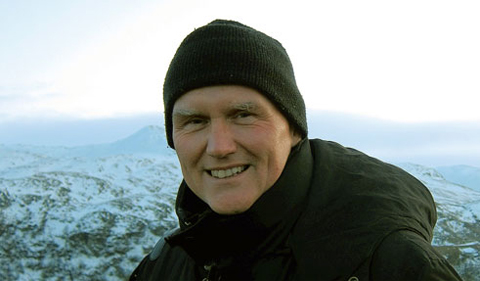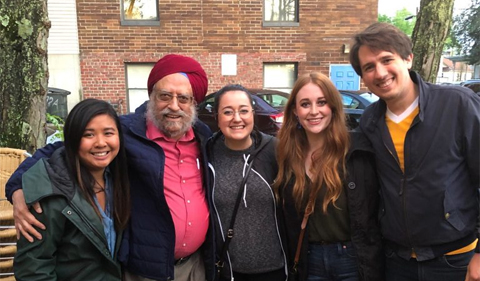By Regina Yoong
The English Department hosted a retirement social in April honoring three professors: Dr. Joan Connor, Dr. Gabriel Hartley and Dr. Amritjit Singh.
Although specializing in different fields—Connor in creative writing (fiction), Hartley in 20th-century poetry, and Singh in African-American literature—all three contributed immensely to OHIO’s English Department in their own unique way.
Joan Connor: A Creative Soul and Generous Spirit
“One thing I will always appreciate about her are the tokens of her life that she has shared with me such as necklaces that she bought at boutiques in Vermont, post cards found in antique stores, and just her reflections on life and stories of experience,” said Leah Nash ’17, ’19M, who graduated with a B.A. and an M.A. in Creative Writing, fiction. Nash knew Connor as an undergraduate student and had Connor as an adviser on her master’s thesis. “I see Joan as an instructor, friend, and role-model for my life.”
Dr. Linda Rice, Professor and Chair of English, spoke of Connor affectionately, “When I think of Joan Connor I think of a caring faculty member who always brought warmth, good humor, and a spirit of generosity to the department.” Rice spoke about a time when Connor read her work at Writers Harvest, an annual benefit fundraiser for the Southeast Ohio Food Bank. “I was new in the department at the time and remember her reading this short story she’d written in which the UPS man played a key role. It was so funny, and Joan’s performance would have made just about anyone want to be such a writer. She has been a great teacher and mentor to so many students through her distinguished career.”
Besides touching many lives, colleagues and students, Connor described two milestones in her career when she won the Association of Writers and Writer’s Program award for short fiction in 2002 for her short story, “History Lesson,” and the River Teeth Literary Nonfiction award for her book, The World Before Mirrors, in 2006.
George “Gabriel” Hartley: Loving Life and Teaching
Hartley was popular and well-loved by his students, with one of his undergraduate students exclaiming, “Dr. Hartley is one of the most incredible professors I’ve ever had. He’s a wonderful man, and he makes the class interesting, humorous, and enjoyable.”
Rice reiterated, “When I think of Gabriel Hartley I think of a kind and very thoughtful faculty member who was passionate about helping students to expand their worldview and reading list. Gabriel is the kind of person you could just sit down with and have a great conversation about life and art and meaning. I have always appreciated how unassuming Gabriel is, and I think this is one of the qualities that made his students enjoy his classes so much.”
Hartley said that, through his 20 years teaching at OHIO, he most appreciated his freedom to recreate himself as a scholar and professor as his own research goals and self-definitions changed over time. “This freedom allowed me to remain fresh in terms of enthusiasm, which my students especially appreciated, and to stay true to my own inner guidance along the path of knowledge.”
Hartley reflected, “While my publishing achievements are sources of personal pride for me, I would say that the most important milestones I achieved follow, again, from my ability to follow my areas of focus from my initial academic definition as a scholar of Critical Theory and American and British poetry to a scholar and activist in multicultural anti-imperialist political consciousness….”
Hartley is a strong advocate and scholar of “heightened states of consciousness most often defined in terms of Romanticism and Shamanism.” He believes that there is an “ever-increasing demand in our global society for the unrestricted pursuit of knowledge and truth and the unmasking of power plays in an increasingly fascistic political culture worldwide.”
Amritjit Singh: 50 Years of Teaching
Singh’s illustrious career has spanned well over 50 years and has been far-reaching in its impact through his extensive publications, mentoring, networking, and leadership positions in major professional organizations.He was invited to join OHIO in January 2006 as the Langston Hughes Professor and was recently honored by the Board of Trustees as Professor Emeritus of English. In and around the department, Singh has been known for his indefatigable energy and his direct, jargon-free style. Passionately invested in the department and its future, he offered at least six brand new graduate courses in American Studies, besides teaching a wide variety of elective undergraduate courses in African American Literature and other areas.
Nitin Luthra, a Fulbright Foreign Language Teaching Assistant (FLTA) in 2016-2017, was part of Singh’s graduate Seminar on William Faulkner and Toni Morrison in Fall 2016. Luthra recalls, “The stimulating debates and discussions led by Professor Singh, both inside and outside the classroom,” that allowed him to delve into the issues of race and American identity in new ways.
Aaron Babcock, a Ph.D. candidate in Literary History and a former teaching assistant in Singh’s undergraduate class, reiterates Singh’s ability to challenge his students to think outside the box. “When we were covering Robert Frost’s “Mending Wall”—a poem I felt that he knew inside and out, became new to me as Professor Singh led the class in a close reading of the piece. He prompted me to reconsider my ideas about the aesthetic and thematic concerns of Frost in the poem.”
Outside of the classroom, Singh brought many engaging guest speakers to OHIO, including Thadious Davis and Herman Beavers of the University of Pennsylvania, Joyce Ann Joyce of Temple University, and Venetria Patton of Purdue University. In November 2017, he introduced Martha Cutter of the University of Connecticut at the inaugural Langston Hughes Lecture. Despite his distinguished career and achievements, Singh remains very approachable and willing to support other scholars in the United States and around the world. On May 26, at the retirement social for him, Connor, and Hartley, he was urged to make a speech. This is all he said in his brief remarks marked by understatement: “It has been a good journey, with many ups and downs. All of us can be better than we are. That includes me.” Reminiscing his time at OHIO, Singh describes his joy in teaching and mentoring by sharing a saying in Punjabi: “Tasting gooseberries and receiving an elder’s counsel—they taste better later on!” He explains that good mentoring often requires blunt and honest feedback to help the students grow intellectually and emotionally. Students often do not value such critique immediately. He hears frequently from former students with words of appreciation.





















Comments